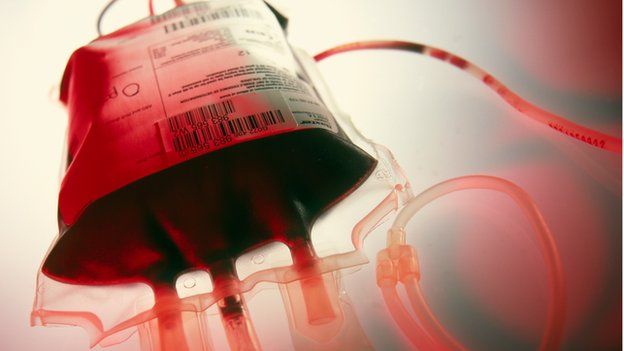Ebola blood-therapy team set up
- Published

An international team of scientists has been set up to determine the effectiveness of using the blood of Ebola survivors as a treatment.
It is hoped the antibodies used by the immune system to fight Ebola can be transferred from a survivor to a patient.
The study will start in Guinea and is led by the Institute of Tropical Medicine in Antwerp, Belgium.
The European Union has given 2.9m euros (£2.3m) to fund the project.
There are no widely available, proven drugs or vaccines for Ebola.
The World Health Organization has backed the use of survivors' blood as the worst outbreak of Ebola in history continues to get worse.
Blood medicine
People produce antibodies in the blood in an attempt to fight off an Ebola infection.
In theory, those antibodies can be transferred from a survivor into a sick patient to give their immune system a boost.
However, large-scale data on the effectiveness of the therapy is lacking.
Studies on the 1995 outbreak of Ebola in the Democratic Republic of Congo (DRC) indicated seven out of eight people survived after being given the therapy.
Is it safe?
Johan van Griensven, from the Institute of Tropical Medicine, said: "Blood and plasma therapy are medical interventions with a long history, safely used for other infectious diseases.
"We want to find out whether this approach works for Ebola, is safe and can be put into practice to reduce the number of deaths in the present outbreak.
"Ebola survivors contributing to curb the epidemic by donating blood could reduce fear of the disease and improve their acceptance in the communities."
In total more than 4,800 people have died of Ebola.
Ebola deaths
Figures up to 13 January 2016
11,315
Deaths - probable, confirmed and suspected
(Includes one in the US and six in Mali)
-
4,809 Liberia
-
3,955 Sierra Leone
-
2,536 Guinea
-
8 Nigeria
Collaboration
The efforts will be a collaboration between the Institute of Tropical Medicine, University of Liverpool, London School of Hygiene and Tropical Medicine, University of Oxford, Aix-Marseille University, the French Blood Transfusion Service, Institute Pasteur, and the French National Institute of Health and Medical Research.
The consortium also includes the National Blood Transfusion Centre in Conakry, Guinea, the Institut National de Recherche Biomedicale in Kinshasha (DRC), and the Belgian Red Cross-Flanders.
The Wellcome Trust, a medical charity based in the UK, is also working on the project.
Its director, Jeremy Farrar, said: "Convalescent serum offers the best potential treatment for Ebola in the short term that could be scaled up if proven effective.
"Global collaboration of this nature, including clinical researchers and multiple partners from across Europe and West Africa, is both unprecedented and essential if we are to bring the current outbreak under control."